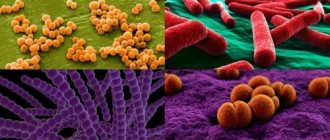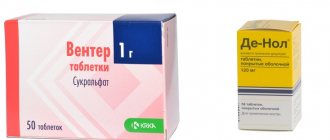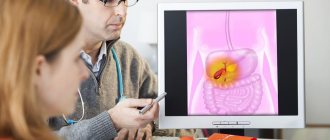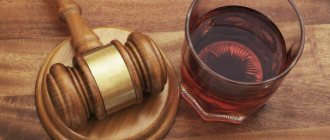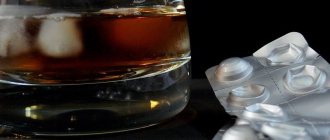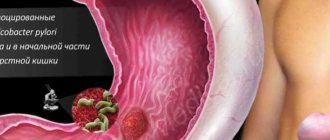De-nol is an effective drug that is actively used in the treatment of gastric and duodenal ulcers. It is widely used due to its enveloping, anti-inflammatory and bactericidal effect, helps prevent further development of the disease and promotes rapid healing of the mucosa. How to take the drug correctly, and is it possible to combine De-nol and alcohol?
Compatibility of De-Nol and alcohol
Alcohol and De-nol? have poor compatibility. Alcoholic drinks have the opposite effect of the medicine. They irritate the gastric mucosa and increase the production of hydrochloric acid and digestive enzymes.
The active substances of the drug trigger regeneration processes and heal damage. Ethanol, on the contrary, increases the size of cracks because it has a vasodilating effect.
Read reviews about this medicine!
After drinking, alcohol enters the stomach, where ethanol is absorbed into the blood and delivers its first blow. If there are diseases of the gastrointestinal tract, the condition of the digestive system is aggravated. You cannot combine alcohol and medicine.
Characteristics of the drug
De-Nol is an effective and popular drug used in the treatment of pathologies of the digestive system. The medicine is produced in the Netherlands. The cost of the drug is high, so patients often replace it with analogues. But doctors do not advise doing this, because... the medicine has unique medicinal properties that domestic medicines do not have. Ulcerative gastritis, a disease of the duodenum and stomach, is caused by the bacterium Helicobacter pylori. This remedy effectively fights bacteria and existing complications.
De-Nol is produced in tablets. Antibacterial, anti-inflammatory, bactericidal, wound-healing and enveloping medication has a beneficial effect on the duodenum and stomach. Once in the cavity of the digestive system, the substance forms a specific film that envelops the mucous membrane and protects it from corrosion by gastric juice. Together with protecting the walls of organs, the medication destroys the structure of pathogenic microorganisms, preventing their re-development.
The active ingredient of the drug is bismuth, a heavy group metal often used in medicine and pharmaceuticals. The interaction of the metal with gastric protein is accompanied by an astringent and anti-inflammatory effect. You need to take the medication for 2-3 months, following a special diet. The tablets are washed down with water - this preserves the medicinal properties of the substance. Juice, milk, or other drink may reduce the effectiveness of the medicine.
A doctor may prescribe treatment with De-Nol for the following pathologies:
- acute phase of gastritis with the presence of inflammatory processes on the gastric mucosa - gastroduodenitis and gastritis;
- ulcerative lesions of the intestinal mucosa, stomach and esophagus;
- signs of an irritated cavity of the small intestine - chronic constipation or diarrhea;
- disturbances in the digestive process, which are accompanied by severe pain;
- the presence of heaviness in the stomach, especially after eating;
- bloating, accompanied by increased rumbling;
- increased gas formation in the small intestine;
- irritable duodenum with accompanying symptoms;
- decreased or complete lack of appetite;
- general weakness due to rapid fatigue;
- Zollinger-Ellison syndrome.
The medication is not characterized by an analgesic effect, but has antibacterial properties. Because of this characteristic, the patient believes that it is possible to combine alcohol with De-Nol without serious consequences. The question also arises due to the long period of therapy. The compatibility of the drug with alcohol leads to excessive load on the liver and problems in human health.
Despite positive reviews from practicing doctors and patients, the medication has a number of contraindications:
- women should refrain from taking pills while carrying a child - this can provoke genetic mutations with other developmental defects of the unborn child;
- while breastfeeding a newborn;
- in the presence of an allergic reaction to incoming components;
- in case of severe kidney disease - renal failure.
During treatment, the patient may experience side effects:
- rashes on the surface of the skin with itching;
- attacks of nausea with gagging;
- irritation of the intestinal mucosa, accompanied by prolonged constipation or profuse diarrhea;
- feces acquire a dark shade, close to black;
- after a certain time of administration, the tongue turns dark;
- short-term loss of memory and concentration;
- failure of the kidneys.
The doctor calculates the course of treatment individually for each patient. It is not recommended to take pills on your own. Before prescribing, the doctor takes into account age, body weight, existing diseases and the degree of damage to the body. Take the tablets half an hour before meals. You cannot take the tablets with anything other than water - this will reduce the effectiveness of therapy.
The medicine can be taken by children from 4 years of age. At this age, a dose of 8 mg per kilogram of body weight is allowed. After 8 years, the child drinks 1 tablet 2 times a day. Adults and teenagers over 12 years of age take 2 tablets morning and evening. The course can last 5-8 weeks.
Characteristics of the medication
It is a gastroprotector that is used to treat ulcers and gastritis. Bismuth dicitrate in its composition protects against the aggressive effects of hydrochloric acid and restores the mucous membrane.
It has the following properties:
- Knitting;
- Anti-inflammatory;
- Bactericidal;
- Enveloping;
- Antibacterial;
- Regenerating.
The drug works on the affected areas of the mucous membrane, so it is effective.
Indications for use:
- Peptic ulcer of the stomach or duodenum;
- Inflammatory processes of the gastrointestinal tract, for example, gastritis, duodenitis;
- Dyspeptic manifestations;
- Diarrhea, irritable bowel syndrome.
To be cured, the drug is taken in courses. Sometimes treatment lasts up to 1-2 months.
Use for hangover
A hangover is a post-intoxication state that occurs after alcohol abuse. In essence, this is alcohol poisoning, from which the entire body suffers, but most of all the gastrointestinal tract, liver and brain.
Due to irritation and inflammation of the gastric mucosa, a person experiences nausea, vomiting, and abdominal pain. To prevent the transformation of the inflammatory process into gastritis or ulcers, it is better to start taking a gastroprotector.
It will protect the mucous membrane from the negative effects of ethanol breakdown products. But after taking it, you should not have a hangover from beer or other alcoholic drinks.
Features of De-Nol therapy
The medicine should not be used if you have severe kidney disease, pregnant or breastfeeding women, or children under 4 years of age.
The substance should not be combined with drinks such as alcohol of any strength, whole milk and other fermented milk products, freshly squeezed juices from fruits and tetra packs, sweet carbonated drinks.
Along with taking a strong medication, you must follow a special diet, which consists of avoiding fatty foods and fried foods. The diet should contain a large amount of plant fiber, beneficial microelements and vitamins.
Drinking alcohol with a high dose of the drug is prohibited - this will cause severe stress on the kidneys and liver. Destructive processes in kidney tissue require hemodialysis in a hospital setting.
De-Nol cannot be used in conjunction with drugs from the antibiotic group - Minocycline, Oxytetracycline, Doxycycline, Demeclocycline and Metacycline.
The substance is drunk before meals - 30 minutes before, washed down with plenty of clean water. You cannot prescribe treatment on your own, especially to relieve symptoms of excessive alcohol consumption.
The result of combining alcohol with medication
If you drink alcohol during therapy, there will be no therapeutic effect. Instead of being cured of an ulcer or gastritis, the patient suffers complications, such as perforation of the mucosa followed by gastric bleeding. Consequences are likely even after one bottle of beer.
The strength or volume of alcohol consumed is not important. Ethanol leads to a disastrous outcome. It irritates and corrodes the mucous membrane, enhances the production of hydrochloric acid. Another danger of exposure is that it is absorbed in the stomach in places where there is damage.
As a result, ulcers and erosions do not heal, but become larger, relapses of gastrointestinal diseases constantly appear, and there is a risk of gastritis or peptic ulcer becoming chronic.
But there are other consequences:
- Stomach cancer;
- Kidney or liver failure;
- Liver cirrhosis, alcoholic hepatitis, fatty disease;
- Internal bleeding;
- An overdose of a medication, which causes side effects such as dizziness, nausea, vomiting, stool disorders, abdominal pain, allergies.
Alcohol has a bad effect on the functioning of the brain and nervous system. When combined, mood swings, depression and other nervous disorders are possible. One of the most dangerous consequences for humans is bismuth encephalopathy.
Its manifestations:
- Memory impairment;
- Hallucinations;
- Irritability, aggression;
- Sleep disturbance.
The disease mainly develops when the dosage of the medication is not observed or against the background of liver failure. Bismuth is not absorbed by the liver, so it travels through the bloodstream to the brain, where it has a toxic effect.
Indications and contraindications, dosage
The main indications are the following diseases:
- dyspepsia;
- any manifestation of peptic ulcer;
- chronic gastritis;
- Solinger-Ellison syndrome;
- IBS.
The only contraindication for the use of this medicine is severe renal failure and individual intolerance to some components.
De Nol is produced in the form of tablets and is used orally. A child from 4 to 8 years old can take 8 mg tablets per 1 kg of weight, from 8 to 12 years old - 2 tablets per day. In childhood, de Nol is taken 2 times a day. For adults, it is recommended to take 1 tablet 3-4 times a day. The dose is taken 30 minutes before meals, washed down with a huge amount of purified water. Duration – from 5 to 8 weeks. This is followed by a break of 2 months. If necessary, the course is repeated.
Taking pills after drinking alcohol
After drinking a dose of alcohol, it is important to find out how long you can take the drug in order to get a therapeutic effect and not harm yourself. A gastroprotector, like alcohol, puts a strain on the kidneys and liver.
To avoid negative reactions, a person must wait until the breakdown products of ethanol are removed. The longer the interval between alcoholic beverages and the gastroprotector, the less the drug burden on the body. It is optimal to start treatment 2-3 days after drinking alcohol, and preferably 4-5 days.
How soon can you drink alcohol after treatment with De-Nol?
The imported drug is considered the most powerful in the treatment of ulcerative damage to the mucous membrane of the esophagus and other organs of the gastrodigestive tract. Bismuth is not addictive, so the medicine is considered safe for the patient. The substance begins to act directly in the cavity of the stomach or other diseased organ. A small amount of the active drug is absorbed into the blood vessels, so there is no accumulation effect with subsequent intoxication of a person. The kidneys remove the medicine from the body fairly quickly.
For a positive effect from taking the substance, it is necessary to exclude the consumption of alcohol and other medications, and follow a strict diet.
The course of therapy lasts from 4 to 8 weeks. During this time, the patient is on a special diet and under the supervision of a doctor. Then the course is repeated for the same period. The duration of action of the substance lasts for 2 months, a break is taken for the specified period. Therefore, it is worth giving up the feast and limiting the consumption of unhealthy foods.
For people who abuse ethanol-containing products, doctors usually do not prescribe De-Nol therapy - this causes the development of dangerous side effects. In humans, pathologies of the pancreas, kidneys and liver develop. The patient experiences severe discomfort with the formation of severe complications that can be relieved by taking special absorbent substances.
Doctors advise not to take the pills with beer or other high-strength drinks - this will cause irreparable harm to your health.
How long should it take after taking the medication?
The drug is prescribed for a long period of time. It is important to complete the course of treatment. This is 4-8 weeks. During this entire period, alcohol is prohibited.
You should not skip taking your medication to drink a glass of vodka or a glass of beer. A small dose of alcohol neutralizes the therapeutic effect.
After a course of therapy, it is advisable to abstain from alcohol for as long as possible. If you return to your usual lifestyle, exacerbations of gastrointestinal diseases are possible. The drug does not provide a lifelong effect; it eliminates existing problems, and drinking alcohol provokes the appearance of new ones.
De Nol and beer
DeNol is absolutely incompatible with beer. The active component of the drug is the chemical toxin Bismuth. Its therapeutic effect is also reflected in negative consequences for the body.
Drinking alcohol during drug treatment increases the degree of their manifestation:
- A powerful blow is delivered to the liver.
- The formation of ulcerative lesions of the stomach walls is provoked.
- Absorption of the drug is impaired.
For pathologies of the liver, kidneys, ulcers, combining the drug with beer is most dangerous.
The consequences of neglect of one's health are expressed in complications:
- pancreatitis;
- internal hemorrhage;
- cirrhosis of the liver;
Violations are serious and life-threatening.
Organs affected by the toxin
The combined use of pharmacological agents and alcohol has a toxic effect on the internal organs and environments of the body. Alcohol, entering into a chemical reaction with a medicine, leads to poisoning, disrupts physiological processes, enhances or weakens the healing properties of drugs.
The liver suffers more than other organs. She gets hit twice. Many medications have a side effect - hepatotoxicity, destroy cells, and disrupt the physiology of the organ. In the liver, alcohol breaks down to ethanal, a substance 20-30 times more toxic than ethanol, which causes the death of hepatocytes.
Dangerous groups of drugs for the organ in combination with alcohol:
- Anti-inflammatory;
- Hormonal;
- Antibacterial;
- Antifungal;
- Glucose control agents for diabetes mellitus;
- Antituberculosis;
- Cytostatics (chemotherapy drugs);
- Tranquilizers (anti-epileptic, psychotropic).
In second place among the internal organs exposed to the harmful effects of alcohol together with medications are the heart and vascular system. Strong drinks during drug therapy constrict blood vessels and increase blood pressure. The simultaneous intake of alcohol and chemical substances leads to failure of the myocardium and increases the risk of developing an attack of angina pectoris and a heart attack.
A mixture of ethanol and pharmaceuticals disrupts the quality of the blood and reduces clotting. This is dangerous due to internal bleeding and strokes.
Rules for taking medications and alcohol
Drinking alcohol during treatment minimizes the clinical effect of therapy and creates a risk of developing complications of the disease.
If this cannot be avoided, follow the rules of behavior that will reduce the consequences:
- Do not drink strong drinks (vodka, cognac, whiskey), choose dry wine (100-150 ml), beer (no more than 300 ml). Don't drink alcohol on an empty stomach.
- The interval between taking the medicine and alcohol should be at least 2 hours.
- To reduce the toxic effect, take medications that protect the liver (hepatoprotectors), pancreas (pancreatin), and stomach (antacids ─ Rennie, Almagel).
If a person takes antiviral medications for colds, anti-inflammatory drugs, alcohol in moderation does not pose a threat to the body.
Alcoholic drinks during treatment are contraindicated in cases of liver cirrhosis, severe infectious diseases, and during a course of chemotherapy.
Compatibility of the drug with alcohol
The active ingredient bismuth tripotassium dicitrate is classified as a gastroprotector. The property of drugs in this group is capable of healing the affected areas of the mucous membrane of the digestive tract. The incoming components gently envelop the walls of the organs, protecting against the presence of acid and other pathogens. Consumption of alcoholic beverages during this period destroys the protective film, causing repeated damage to the inner linings of the stomach, esophagus and other organs. De-Nol with alcohol nullifies the effectiveness of therapy and leads to a deterioration in the patient’s general well-being.
Bismuth is a heavy metal that breaks down in liver tissue. Drinking alcohol after taking pills or together can cause severe harm to the liver when removing toxic substances and breakdown products of the drug. An impaired filtration process causes the accumulation of ethanol in the blood and subsequent intoxication.
The medication is not compatible for simultaneous use with alcoholic beverages! It is not recommended to be negligent about your own health, as this will provoke the development of severe pathologies against the background of existing diseases.
Ethanol contained in alcoholic products irritates the mucous membrane of the esophagus and stomach, which is accompanied by a malfunction of the system itself. The toxin accumulates in the blood and poisons nearby tissues and organs. The body does not receive useful microelements and substances due to a malfunction of blood vessels with the tissues of vital organs. Subsequently, this leads to vitamin deficiency and weakening of the body.
In people who abuse alcohol, they are often diagnosed with cirrhosis of the liver, stomach ulcers and an inflammatory process in the pancreas - pancreatitis. These pathologies lead to a deficiency of beneficial microelements with vitamins and overload of the liver and kidneys in removing toxic substances.
The instructions for use do not contain a separate clause regarding the compatibility of the drug with alcohol-containing products. But doctors warn that bismuth is a chemical element that, when interacting with ethanol, can lead to unpredictable consequences.
With a healthy liver, the body can cope with double the load. But in the presence of pathologies, a person experiences an acute attack of malaise with the development of other complications. When taking pills with alcohol at the same time, a person experiences the following symptoms:
- the positive effect of the drug is reduced to complete absence;
- the present disease enters the acute phase with the appearance of other complicating consequences;
- attacks of slight dizziness;
- there are disorders of the central nervous system;
- liver failure is actively developing;
- The side effects of the medication are very pronounced.
The manifestation of individual symptoms depends on the age and physical characteristics of the person. There may be no negative consequences or, conversely, severe damage to all body systems.
Medicines, alcohol and chronic diseases
If a person has chronic diseases, simultaneous use of alcohol and medications is potentially dangerous for the functioning of vital organs. Since patients systematically take prescribed medications, the influence of alcohol can lead to negative consequences.
People with chronic heart disease (angina pectoris, heart defects) develop arrhythmias of varying severity. Heart attacks with severe pain syndrome develop, which is not relieved by Nitroglycerin, and the risk of developing myocardial infarction increases significantly.
In case of chronic liver diseases (viral hepatitis, hepatosis), alcohol during treatment will become a trigger in the development of cirrhosis and hepatocellular carcinoma (cancer).
Drinking alcohol during cirrhosis leads to the following consequences:
- Bleeding into the abdominal cavity;
- Liver decomposition, infection, peritonitis;
- Hepatic coma;
- Death.
If a person is on long-term treatment with sedatives, psychotropic drugs, tranquilizers, he is contraindicated in drinking alcohol. This leads to severe depression and the appearance of obsessive states (hallucinations, phobias). Suicidal feelings develop. The patient needs constant monitoring and assistance from a psychiatrist.
The most dangerous combinations and consequences
The combination of alcohol and chemical-based drugs leads to serious disorders in the body, and sometimes to fatal consequences.
List of medications and their side effects in combination with alcohol:
| Name of group, drug | Negative results of interaction |
| Neuroleptics (tranquilizers, anticonvulsants, hypnotics) | Severe intoxication, up to cerebral coma |
| CNS stimulants (Theophedrine, Ephedrine, Caffeine) | Rapid increase in blood pressure, hypertensive crisis |
| Antihypertensives (Captofrin, Enalapril, Enap-N), diuretics (Indapamide, Furosemide) | Sudden drop in pressure, collapse |
| Analgesics, anti-inflammatory | Increased toxic substances in the blood, general poisoning of the body |
| Acetylsalicylic acid (Aspirin) | Acute gastritis, perforation of gastric ulcer and 12-PC |
| Paracetamol | Toxic liver damage |
| Hypoglycemic (Glibenclamide, Glipizide, Metformin, Phenformin), insulin | A sharp decrease in blood sugar levels, hypoglycemic coma |
What side effects may there be
Side effects always occur on an individual level. For example, one person may experience vomiting, while another may experience only constipation, a third may experience both, and a fourth may experience nothing at all. The main side effects include:
- nausea;
- vomit;
- skin rashes;
- itching;
- diarrhea or constipation;
- hives.
All these symptoms are mild. Sometimes the tongue may darken and the stool may turn black. In the most severe cases, concentration decreases. De Nol must be used strictly as prescribed by the doctor, that is, you should never increase the dose yourself, otherwise there may be unpleasant consequences.
In case of overdose, the functionality of renal activity is primarily impaired. At the first signs, it is necessary to stop taking the medication and rinse the stomach with copious amounts of liquid, and then call a doctor. Before the doctor arrives, you can give activated charcoal and a laxative.
